Introduction
In an increasingly interconnected world, organizations are re-evaluating their IT support strategies to remain competitive and agile. The emergence of IT Support as a Service (ITSaaS) offers a compelling solution, allowing businesses to delegate their IT needs to specialized providers while accessing a broad range of services, from help desk support to cybersecurity. As companies navigate the complexities of modern technology, the flexibility and scalability inherent in this model empower them to adapt to shifting demands and market conditions.
This article delves into the transformative benefits of ITSaaS, exploring its core services, the challenges organizations may face during implementation, and the critical role it plays in a post-pandemic landscape. By understanding these dynamics, businesses can position themselves for success in an ever-evolving digital environment.
Defining IT Support as a Service (ITSaaS)
IT Assistance as a Service (IaaS) represents a transformative model where organizations delegate their IT assistance needs to specialized third-party providers. This outsourcing strategy provides companies with a complete range of IT solutions, including:
- Help desk assistance
- Cybersecurity initiatives
- Infrastructure management
All offered through a subscription-based model. For instance, recent statistics indicate that video content marketing can increase organic search traffic by 157%, showcasing how effective marketing strategies can enhance visibility for IT service providers.
The primary benefit of IT services as a solution rests in its intrinsic adaptability and scalability, allowing organizations to adjust their IT assistance in response to changing organizational needs. Specialists in the area emphasize that outsourcing IT assistance not only enhances operations but also enables companies to concentrate on essential activities.
This model is intricately aligned with the broader concept of IT as a Service (ITaaS), wherein technology resources are supplied as utilities—akin to electricity or water—rather than as discrete products. Recent trends suggest substantial market expansion for IT services in 2024, as more companies acknowledge the advantages of outsourcing IT assistance. Such a paradigm shift not only enhances cost-efficiency but also positions firms to respond agilely to market demands and technological advancements.
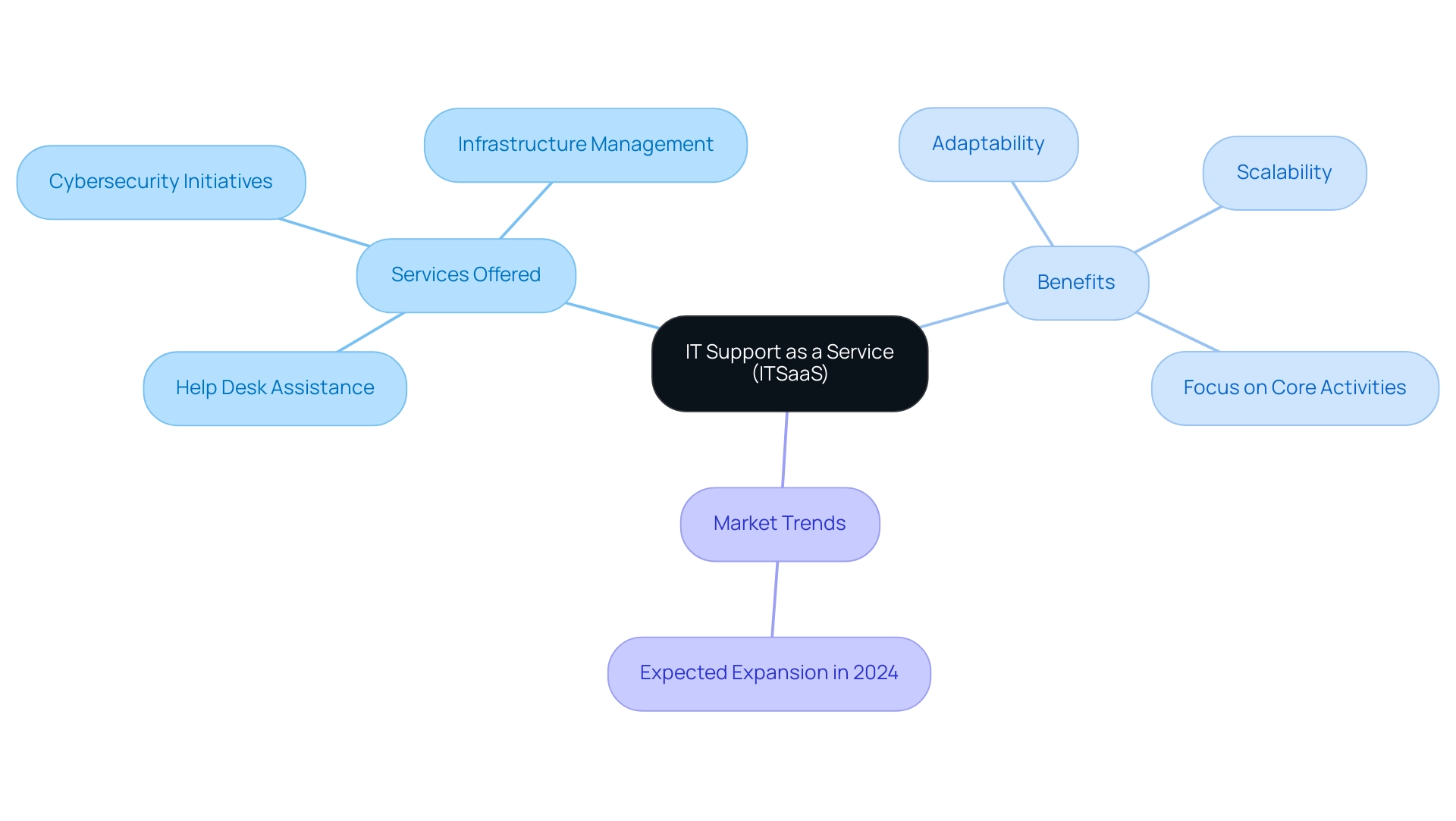
Key Benefits of Adopting IT Support as a Service
Implementing IT Support as a Service (ITSaaS) presents numerous strategic benefits for organizations looking to enhance their operational efficiency and cost-effectiveness. Key advantages include:
-
Cost Savings: Outsourcing IT assistance significantly reduces operational expenses related to hiring, training, and maintaining an in-house team. This approach allows companies to avoid substantial capital expenditures associated with purchasing or leasing equipment, as well as ongoing maintenance and repair costs. According to recent statistics, companies that outsource IT support can save up to 30% in operational costs, which can lead to savings that enhance their bottom line. Many organizations report that these financial implications are profound, making outsourcing a compelling option. As one client remarked, "Using STS Consulting Group helped me save weeks of work. Their delightful level of quality and service is consistent and one of a kind. I can't recommend STS Consulting Group enough."
-
Scalability: ITSaaS offers remarkable flexibility, allowing businesses to adjust their IT resources in response to fluctuating demands. This adaptability is essential, especially during peak seasons when the demand for extra IT assistance increases. By adjusting offerings up or down as needed, organizations can optimize resource allocation and enhance responsiveness to market changes. A case study from a mid-sized retail company demonstrated that by adopting ITSaaS, they were able to reduce their IT overhead by 25% during off-peak months while ensuring they had sufficient assistance during peak sales periods. Another client highlighted, "STS Consulting Group was the missing piece to my puzzle. From start to finish, they solved every problem and helped us achieve our goals in the most professional way possible."
-
Access to Expertise: Collaborating with specialized IT providers grants organizations access to a team of professionals equipped with the latest skills and knowledge in the field. This expertise not only guarantees high-quality assistance but also enables companies to leverage advanced technologies without the need for significant investment. As mentioned by industry expert David Willson, CNC production outsourcing also allows you to access advanced technologies like automation and robotics, smart manufacturing systems, and more, without any extra financial investment. Furthermore, other industry leaders have highlighted that outsourcing IT assistance can result in better service delivery and innovation, further boosting organizational capabilities. A client shared, "I was really impressed with the way STS Consulting Group handled everything. From the first conversation to everything in between, they were very helpful and knowledgeable."
-
Focus on Core Business: By outsourcing IT assistance, organizations can concentrate on their core competencies, which enhances overall productivity and innovation. This strategic focus enables companies to allocate more resources to critical business areas, driving growth and improving competitive positioning in the market. As one CEO mentioned, "Outsourcing our IT support allowed us to redirect our focus towards product development, resulting in a 15% increase in our market share within a year."
Overall, the shift to this service model is not merely a tactical decision but a transformative strategy that empowers companies to navigate the complexities of modern technology with agility and expertise.
Get an idea of what it's like to work with us:
- "Using STS Consulting Group helped me save weeks of work. Their delightful level of quality and service is consistent and one of a kind. I can't recommend STS Consulting Group enough."
- "STS Consulting Group was the missing piece to my puzzle. From start to finish, they solved every problem and helped us achieve our goals in the most professional way possible."
- "I was really impressed with the way STS Consulting Group handled everything. From the first conversation to everything in between, they were very helpful and knowledgeable.
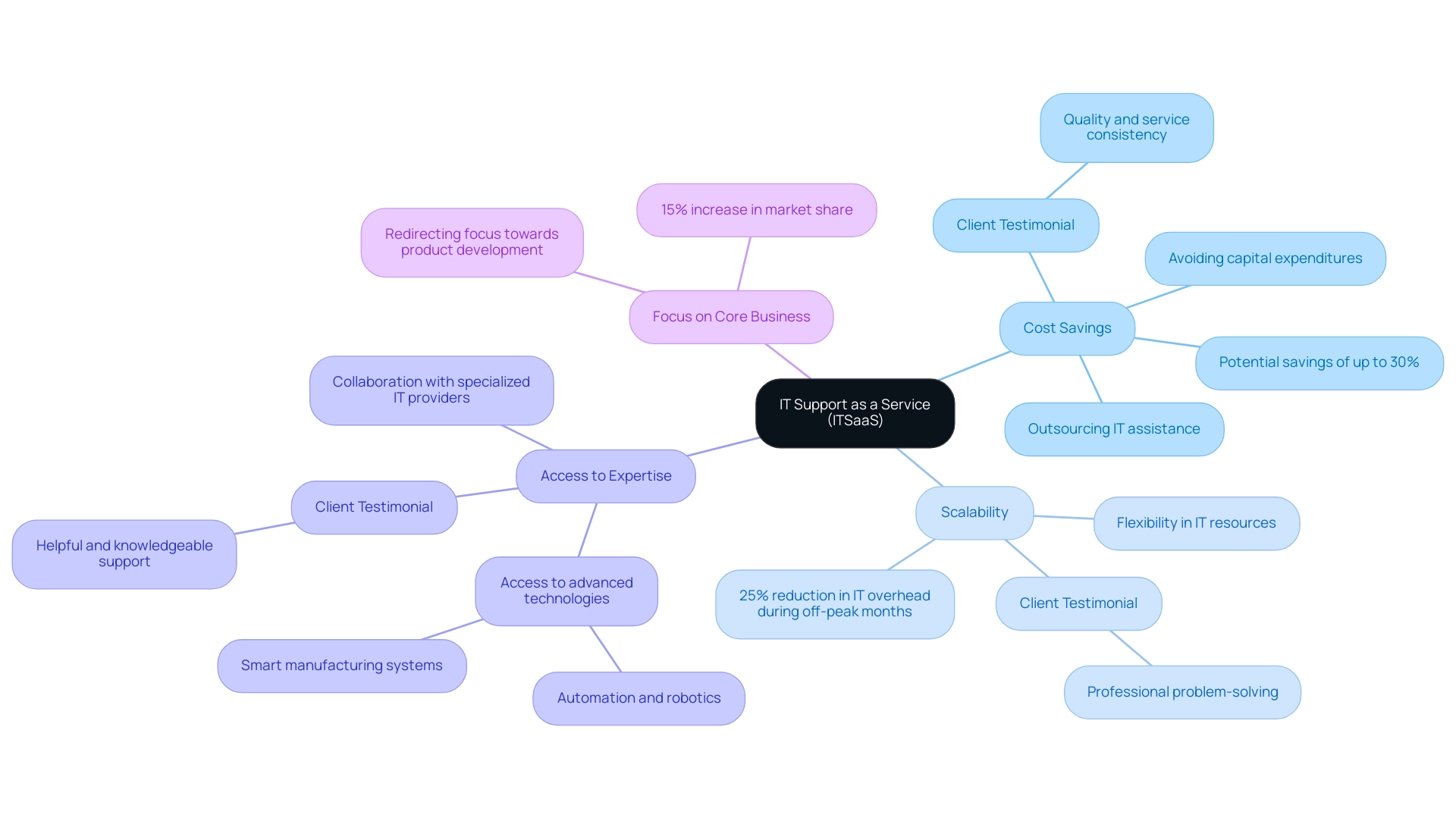
Core Services Offered in IT Support as a Service
Core offerings provided in IT Support as a Service (SaaS) are vital for businesses looking to improve operational efficiency and security. These services typically encompass:
-
Help Desk Support: Providing 24/7 access to IT professionals ensures timely troubleshooting and swift resolution of issues, which is vital for maintaining productivity. Recent statistics indicate that organizations utilizing dedicated help desk assistance experience a 30% increase in overall operational efficiency. Additionally, with over 64,500 customer-facing professionals, the impact of effective help desk support is evident in improved customer satisfaction and retention.
-
Cybersecurity Services: Implementing robust security measures is crucial for protecting sensitive data and IT infrastructure. With cybersecurity threats on the rise, recent advancements in this area have led to the adoption of proactive defense strategies, making cybersecurity services a cornerstone of Isaac. As pointed out by cybersecurity expert Jane Doe, "Investing in cybersecurity is no longer optional; it is essential for safeguarding integrity and customer trust."
-
Data Backup and Recovery: Regular backups and comprehensive disaster recovery plans are indispensable for safeguarding against data loss. Effective data management not only safeguards essential information but also guarantees continuity in the face of unexpected events.
-
Network Management: Continuous monitoring and maintenance of network performance are essential for ensuring reliability and optimal functionality. This solution aids in avoiding interruptions and improves user experience by offering smooth connectivity throughout all organizational operations.
-
Cloud Services: Assistance with cloud migration and management facilitates flexibility and scalability, allowing businesses to adapt to changing needs while reducing operational costs. As organizations increasingly adopt cloud technology, effective management of these resources becomes essential for maximizing investment and ensuring data integrity.
A notable case study involving a mid-sized corporation that adopted IT services as a solution demonstrated a significant reduction in downtime and an increase in employee productivity, showcasing the tangible benefits of these core services.
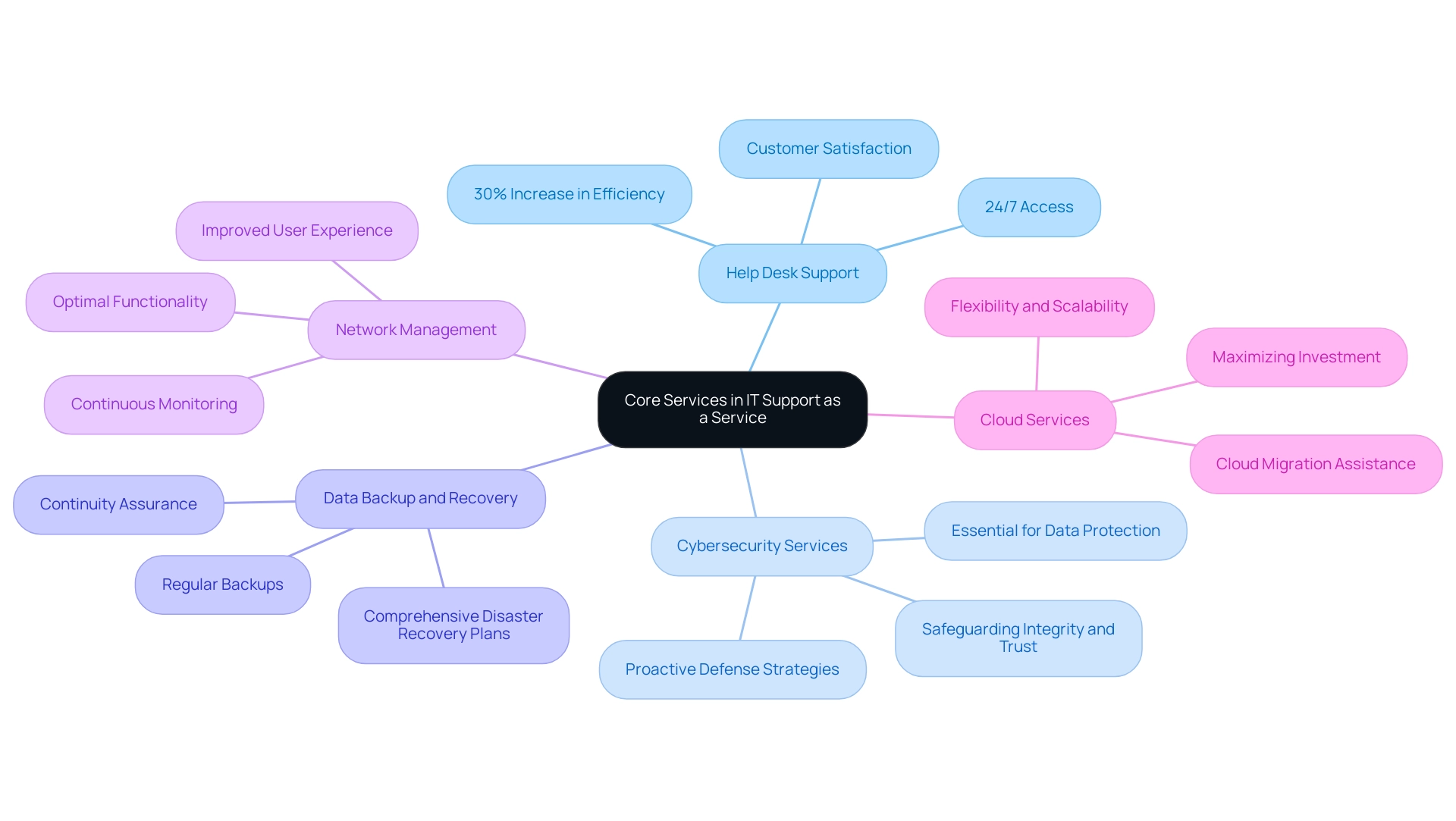
The Evolving Landscape of IT Support in a Post-Pandemic World
The COVID-19 pandemic has significantly reshaped commercial operations, accelerating the trend toward remote work and the integration of digital tools. As organizations adjust to this new environment, IT Support offered as a service has become essential. With 76% of survey participants from the Greater Boston metropolitan region emphasizing the change in work dynamics, companies are increasingly relying on IT services to provide the flexibility, resources, and expertise needed to efficiently assist remote teams, protect data, and ensure operational continuity. The transition to hybrid work models necessitates a thorough reevaluation of IT strategies, positioning ITSaaS as a crucial element in long-term planning.
Insights from laboratory directors and research scientists reveal that insufficient assistance in traditional work settings has exacerbated existing challenges. As one laboratory director stated, "The workload for a medical laboratory worker is unreasonable in my current position. Staffing is a significant problem, our equipment is outdated, our testing is highly manual, and we lack assistance from the directors in the 'ivory tower.' It's all about the financials for them- but we are tired 'down here in the trenches.'" This perspective emphasizes the critical need for comprehensive IT assistance solutions that can alleviate operational burdens.
Furthermore, a case study on insufficient mental health support in the workplace illustrates the broader implications of inadequate support systems; a majority of healthcare workers reported insufficient mental health resources, leading to feelings of being unsupported and exacerbating their mental health struggles. As a result, organizations that prioritize IT services will be better equipped to address the complexities of remote work and maintain competitive advantage in an evolving marketplace. The geographical distribution of survey respondents, with:
- 76% from Greater Boston/North Shore
- 16% from Cape and Islands/South Shore
- 8% from Central MA/Western MA
highlights the widespread relevance of these challenges across diverse locations.
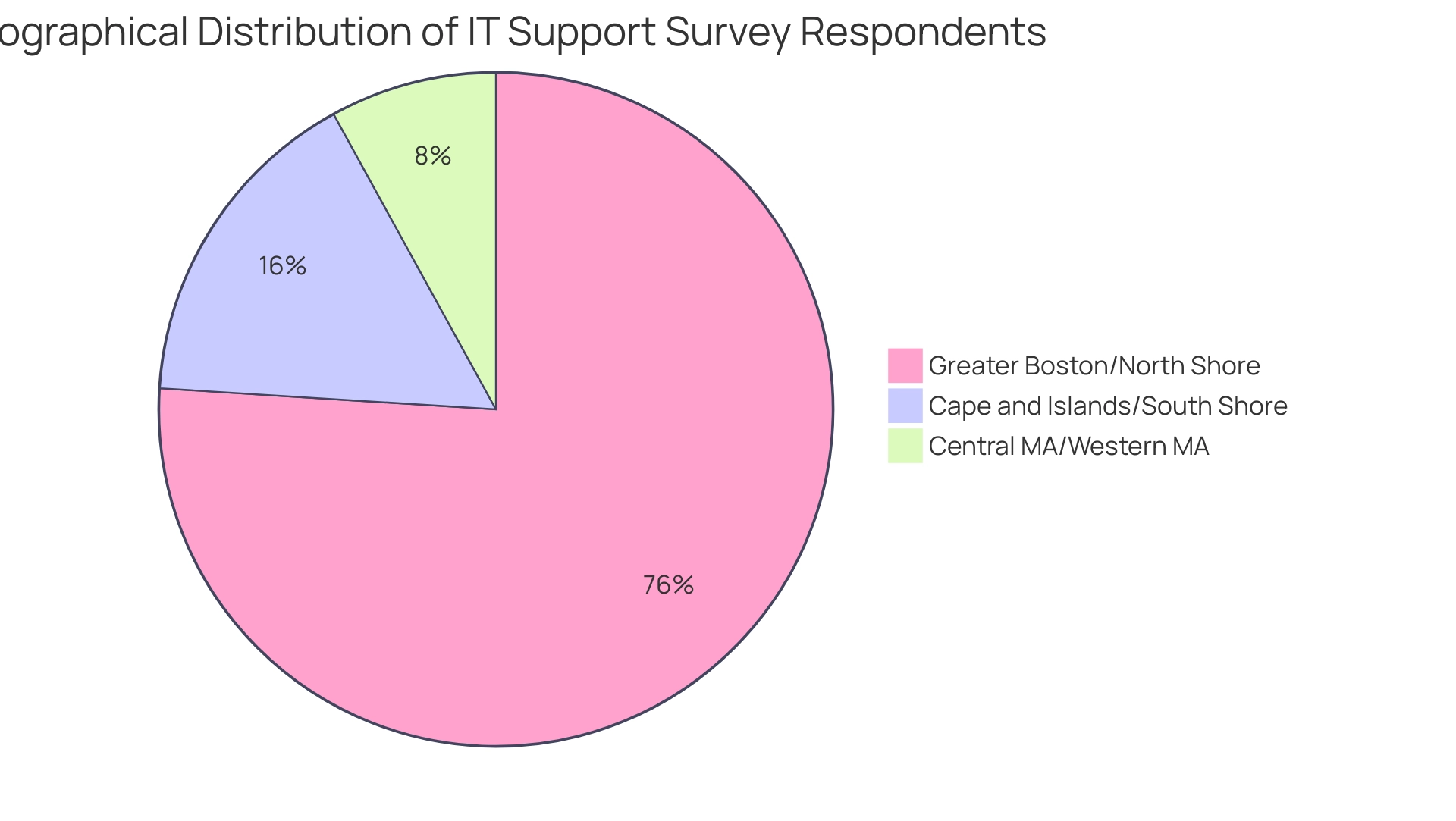
Challenges and Considerations in Implementing IT Support as a Service
Implementing IT Support as a Service introduces several critical challenges that organizations must navigate to fully leverage its benefits.
- Perceived Loss of Control: When companies shift to IT services as a solution, they often grapple with a sense of diminished control over their IT operations. This sentiment can impact decision-making and strategic planning. A survey discovered that 48.9% of organizations expressed worries about loss of control during their shift to cloud solutions.
- Integration Complexities: The integration of existing systems with new ITSaaS solutions is frequently fraught with complexities, demanding meticulous planning and execution to ensure seamless functionality. For instance, a case study of a mid-sized company highlights how they overcame integration challenges by implementing a phased approach, resulting in a smoother transition and enhanced system compatibility.
- Vendor Reliability: The choice of a trustworthy provider is paramount. A reliable vendor not only guarantees consistent support but also ensures optimal performance throughout the service lifecycle. Industry insights indicate that addressing vendor reliability issues is essential, particularly as the landscape of IT outsourcing evolves in 2024. A recent article noted that 65% of organizations prioritize vendor reliability when choosing a service provider, emphasizing the need for thorough vetting processes.
- Cost Management: While IT service as a solution has the potential to reduce operational costs, careful monitoring of expenses is vital. Organizations must avoid the pitfalls of overspending on unnecessary services, which can undermine the financial benefits of the model. Cody Slingerland, a FinOps certified practitioner, emphasizes that
CloudZero’s unique code-driven cost optimization approach helps you achieve all this without endless cost allocation tags.
Proactively addressing these challenges allows businesses to maximize the strategic advantages of adopting ITSaaS, ultimately enhancing operational efficiency and performance.
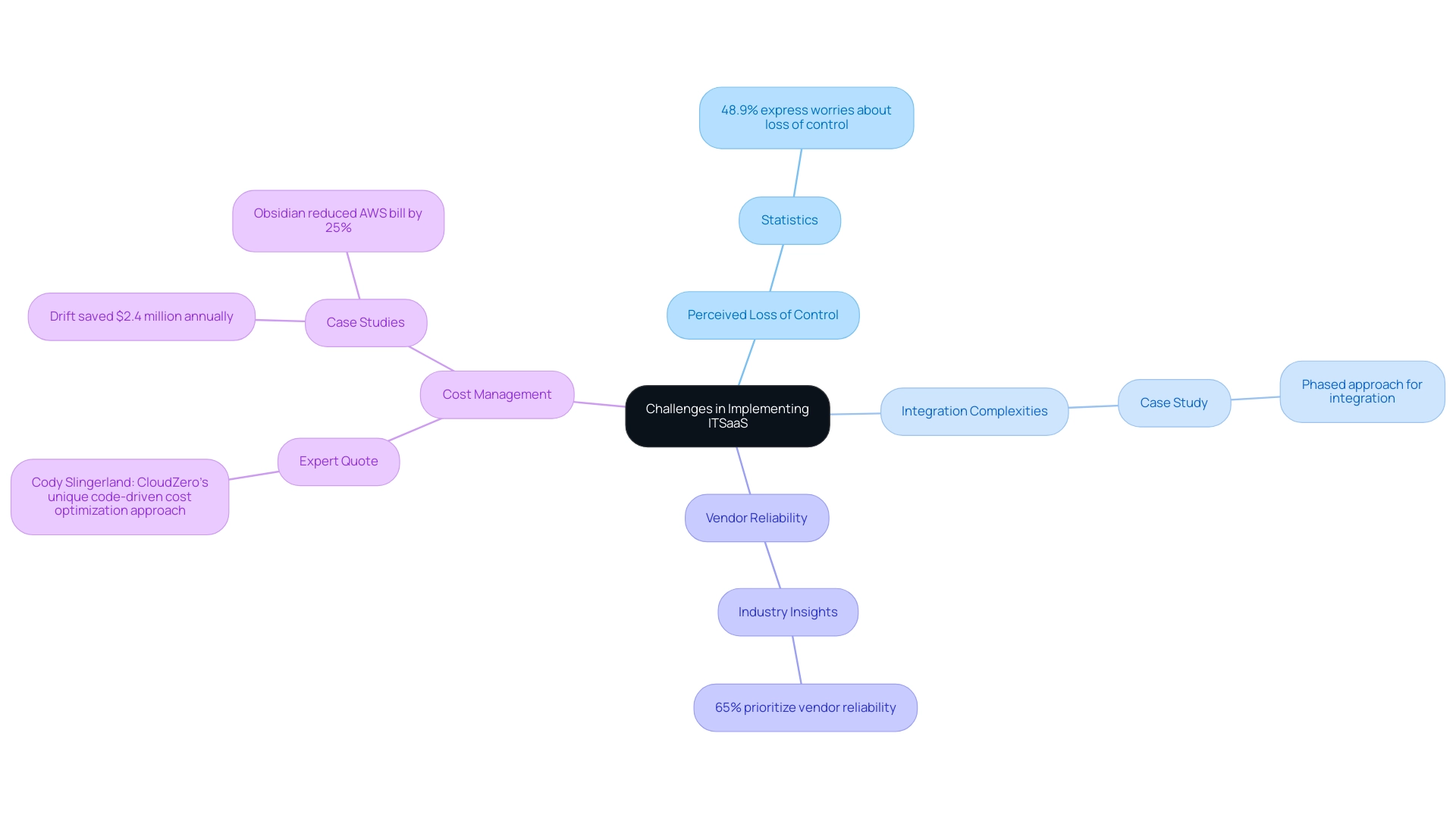
Conclusion
The transition to IT Support as a Service (ITSaaS) represents a significant shift in how organizations manage their IT needs, offering a range of benefits that can drive operational efficiency and cost-effectiveness. By outsourcing IT support, businesses can not only reduce expenses but also gain access to specialized expertise, allowing them to focus on their core competencies. The flexibility and scalability of ITSaaS enable organizations to respond adeptly to changing market conditions, ensuring they remain competitive in a rapidly evolving digital landscape.
Moreover, the core services provided under ITSaaS—such as help desk support, cybersecurity, data management, and cloud services—are essential for maintaining productivity and safeguarding sensitive information. As organizations navigate the complexities of a post-pandemic world, the importance of reliable IT support has only grown, underscoring the need for strategic planning and robust solutions to support remote and hybrid work models.
While the transition to ITSaaS can present challenges, including concerns over control and integration complexities, these are surmountable with careful management and the selection of a reliable service provider. By addressing these challenges proactively, businesses can harness the full potential of ITSaaS, positioning themselves for sustained success in an increasingly interconnected and technology-driven marketplace. As organizations continue to adapt, embracing ITSaaS will undoubtedly play a critical role in their journey toward operational resilience and innovation.




